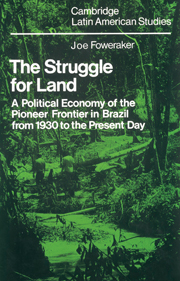 The Struggle for Land
The Struggle for Land Published online by Cambridge University Press: 29 October 2009
In explaining the process of frontier expansion, the emphasis has rightly been placed on spontaneous migration to the frontier, rather than on planned colonisation of the frontier. The pioneering movement is primarily determined, as was argued in Chapter 3, by the ‘surplus’ of labour and monopoly of land in the countryside, and by the rising demand for staple foods in the cities. Planned colonisation appears to have contributed little to the movement, not because plans for colonisation were lacking, but because most such plans, both public and private, met with failure. Public planning of colonisation has recurred throughout the period of the pioneer frontier, with occasional concerted efforts to direct the pioneering movement, such as the series of incentives to colonisation provided by Vargas under the Estado Novo, which were heralded collectively as ‘The March to the West’ (Esterci 1972). But of the tens of national colonies inaugurated in the years following the collation of this legislation in 1945, only one or two managed to survive and prosper (Diegues 1959), which is indicative of the small success of public colonisation initiatives over the period. Such public policies necessarily obeyed political imperatives, such as ‘peopling the political boundaries of the nation’, and therefore the collapse of most of the colonies may be explained by a lack of any economic viability. But private colonisation plans, which in principle should respond to clear economic incentives, appear to have met a similar fate.
To save this book to your Kindle, first ensure [email protected] is added to your Approved Personal Document E-mail List under your Personal Document Settings on the Manage Your Content and Devices page of your Amazon account. Then enter the ‘name’ part of your Kindle email address below. Find out more about saving to your Kindle.
Note you can select to save to either the @free.kindle.com or @kindle.com variations. ‘@free.kindle.com’ emails are free but can only be saved to your device when it is connected to wi-fi. ‘@kindle.com’ emails can be delivered even when you are not connected to wi-fi, but note that service fees apply.
Find out more about the Kindle Personal Document Service.
To save content items to your account, please confirm that you agree to abide by our usage policies. If this is the first time you use this feature, you will be asked to authorise Cambridge Core to connect with your account. Find out more about saving content to Dropbox.
To save content items to your account, please confirm that you agree to abide by our usage policies. If this is the first time you use this feature, you will be asked to authorise Cambridge Core to connect with your account. Find out more about saving content to Google Drive.